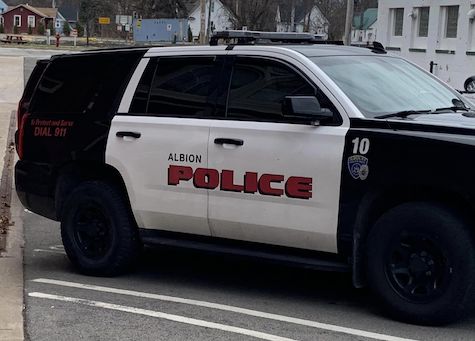Albion village, police union settle pay dispute with officers

Photo by Tom Rivers: A police vehicle is parked outside the police station on Platt Street.
ALBION – The Village of Albion and the union representing Albion police officers have reached an agreement over a dispute where some village officials contended a miscalculation resulted in overpayments to officers for $236,000 over five years.
The village won’t seek to recoup those funds, and will pay back reduced paychecks for one pay period in June when the Mayor Angel Javier Jr. first insisted there was an error in the calculation for the hourly rate, resulting in overpayments of about 5 percent.
The village will pay $7,500 for the union’s legal fees to Bartlo, Hettler, Weiss & Tripi of Buffalo. And current officers will receive a “one-time ratification payment” when the union withdraws its grievance against the village and an “improper practice charge.”
The one-time ratification-inducement payment will be over $1,000 for most of the officers. That amount will be determined by taking 1/8 of the hourly salary and multiplying it by 104, and then again by 3. For example, if the hourly rate is $30, the payment would be $1,170.
The agreement also provides for officers to be paid for any pre- or post-shift briefings for 15 minutes prior to the start of their shifts beginning or ending at either 6 a.m. or 6 p.m.
“The agreement protects the taxpayers,” Javier said today. “It allows the village and the union to come to a final resolution without any multi-year litigation battle.”
While officers will be paid for pre- and post-shift briefings, the agreement doesn’t provide any “doffing” compensation for time spent changing clothes and washing at the beginning and end of shifts. Officers can change into and out of their uniforms at their residence or at a village changing facility, the agreement states.
The agreement also states that the officers’ hourly rate will be determined by dividing the annual salary by 2,080 hours and not 2,184 hours.
The officers will receive back pay in the one period where wages were reduced about 5 percent when the hourly rate was determined by dividing the salaries with 2,184 hours per year instead of 2,080 hours.
“The agreement also clears up any ambiguity going forward,” Javier said.
A CPA firm in July concluded a forensic audit, looking at officers’ pay checks over five years, and concluded the village paid $236,000 in overpayments.
The Bonadio Group said the village made an error in determining the hourly pay rate. The firm said the annual salaries should have been divided by 2,184 hours. That’s 84 hours multiplied by 26 weeks.
The village shifted from having officers work five 8-hour shifts a week to 12-hour shifts in July 2016. With the 12-hour shifts officers worked seven shifts every two weeks for 84 hours of straight time. The change was made to reduce overtime in the police department and to give officers more days off. (Officers aren’t eligible for overtime until they exceed 84 hours over two weeks.)
When the village made the change with the new shift schedule, it used the hours in a 40-hour week or 2,080 for the year. When the salary was divided by 2,080, instead of 2,184, the hourly rate was about 5 percent higher than it should have been, Bonadio said.
The firm’s report said 15 officers were overpaid ranging from $650 to a maximum of $27,000.
Deputy Mayor Joyce Riley said the village was in a difficult position and couldn’t just overlook the overpayments.
As part of settlement negotiations, the officers’ union raised other issues with sick days, vacation days and compensation for pre-shift and post-shift briefings that would have exceeded the $236,000 in overpayments, Riley said.
The village board chose to reach the agreement and not seek the overpayments, while the union backed off on most of the other concerns. The board believed it was a fair compromise.
“The other issues the PBA (Police Benevolent Association) brought up that were longstanding,” Riley said. “If we knew about them we would have addressed them.”
Riley and Javier both said they are thankful the matter is settled.
“We attempted to address a very real issue,” Riley said today. “It is resolved so we can move forward.”






































































